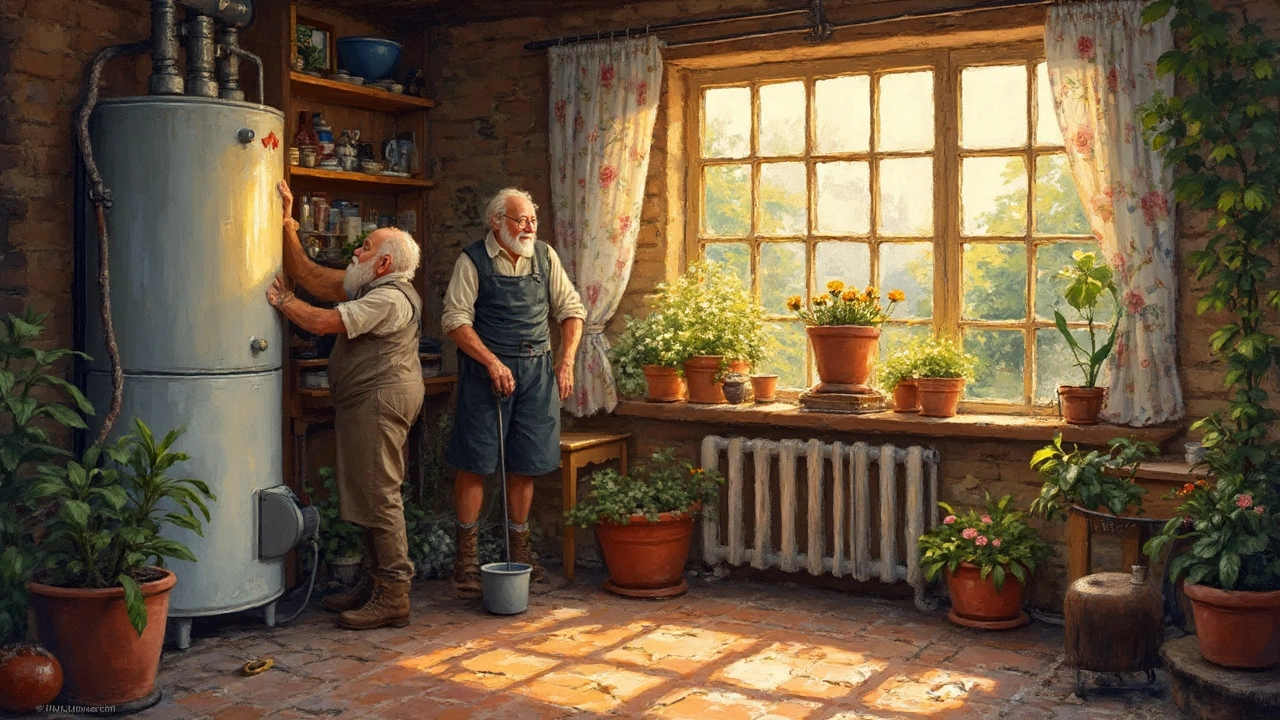Ever got up for a morning shower only to find the water's ice-cold? That's the kind of wake-up call nobody wants. One of the most common hot water heater problems is, unsurprisingly, water that's not hot enough or downright cold. This can be due to a faulty thermostat or heating element, both of which can usually be fixed or replaced without too much hassle.
Another frequent issue is leaks. If you notice puddles around your heater, don't ignore them. Leaks often stem from corroded tanks or loose connections, and they could lead to bigger troubles if not addressed quickly. Sometimes, a simple tightening of connections or a patch job can do wonders.
Sometimes, your heater doesn’t produce any hot water at all! It's often a case of a tripped circuit breaker or a blown fuse. But if it keeps happening, it's best to look deeper – maybe into more complex electrical problems or even the age of the unit.
Speaking of age, a lot of heater issues trace back to lack of maintenance. Regular check-ups can prevent a lot of headaches down the road. Flushing the tank annually to remove sediment build-up is a great place to start.
If these DIY tips don't solve the issue, that's when you should consider calling a professional. They can assess whether it’s better to repair or replace, saving you from future stress and expenses.
- Understanding Temperature Issues
- Dealing with Leaks
- No Hot Water: Possible Causes
- Maintenance Tips for Longevity
- When to Call a Professional
Understanding Temperature Issues
Finding that your hot water heater isn't dishing out hot water can ruin anyone's day. To troubleshoot this, the first suspects are usually the thermostat or the heating elements. Sometimes, these components just need a bit of attention or a quick adjustment.
Check the Thermostat Settings
The thermostat is basically the quarterback of your hot water system. It sets the temperature, so if it's off, your water won't heat properly. Make sure it's set at a decent temperature, around 120 degrees Fahrenheit, which is both warm enough for comfort and safe to prevent burns.
Testing the Heating Elements
If the thermostat isn't the problem, the heating elements might be. These elements do the heavy lifting when it comes to actually warming the water. If they're faulty, the water could stay lukewarm at best. Luckily, testing them is pretty straightforward with a multimeter.
- Turn off the power to the heater.
- Open the panel covering the elements and thermostat.
- Use a multimeter to test the heating elements. If it reads a high resistance, it's time for a replacement.
Look Into Sediment Build-Up
Another culprit could be sediment build-up. Over time, minerals from water can settle at the bottom of the tank, creating a barrier between the burner and the water it’s supposed to heat. This can significantly drop the heater's efficiency. Flushing the tank once a year can help clear this out.
Statistical Insight
Did you know? According to a recent survey, 35% of water heater repairs are related to temperature issues. Most of these repairs involve simple adjustments or part replacements!
Understanding the basic components and common problems with your hot water heater can save you time and money. But if these solutions don't solve the issue, it might be time to call in the pros.
Dealing with Leaks
Water heater leaks are more common issues than you might think, yet they often get ignored until they're too big to handle. A small drip might not seem like a big deal, but over time, it can lead to serious damage and higher water bills.
First things first, if you spot a leak, it's important to determine where it's coming from. Is it the tank itself, or maybe valves or connections? Different sources need different approaches.
Check the Connections and Valves
The most straightforward fix is checking all the connections and valves. Sometimes, a loose drain valve is the culprit. Use a wrench to tighten any part that seems unsecure. Make sure everything is snug, but don't overtighten, as that can create more problems.
Look for Corrosion
If the tank itself is leaking, look for signs of rust or corrosion. Unfortunately, a corroded tank means it's probably time for a new hot water heater. Once a tank starts rusting, it usually can't be patched effectively.
Regular Maintenance to Prevent Leaks
Prevention is key. Regular maintenance can help catch potential leaks early. Flushing the tank regularly gets rid of sediment build-up, a common cause of leaks and reduced efficiency.
If you're not comfortable tackling these problems solo, or if you've done troubleshooting without any luck, it's wise to call a professional. They can ensure your water heater remains efficient and leak-free.

No Hot Water: Possible Causes
Finding yourself in a cold shower isn't just uncomfortable; it's downright frustrating. When your hot water heater refuses to cooperate, there are a few usual suspects to consider.
Tripped Circuit Breaker or Blown Fuse
If you have an electric water heater, a tripped circuit breaker or blown fuse might be the culprit. Check your main electrical panel and reset any breakers if needed. For fuses, replacing them should do the trick. This simple fix often solves the problem.
Faulty Thermostat
Your heater's thermostat might be on the fritz. If it's not properly regulating the temperature, you'll probably need to replace it. A qualified electrician can easily verify and swap out a defective thermostat.
Defective Heating Element
In an electric heater, the heating element is crucial. If it's defective, it can't warm the water effectively. A technician can test and replace a worn-out element if necessary.
Pilot Light Issues
For gas heaters, the pilot light going out is a common problem. Re-lighting it can often solve the issue, but if it keeps going out, it might indicate a problem with the thermocouple or pilot control valve.
Gas Supply Problem
If there's no hot water and your heater doesn't seem to be getting gas, check to see if the gas valve is turned on and the pilot light is lit. If you're unsure, calling your gas provider might help resolve any supply issues.
Age of the Water Heater
If your water heater is over a decade old, it might be time to consider a replacement. Older units aren't as efficient and may struggle to provide consistent hot water.
Diagnosing a hot water heater problem isn't always straightforward. Some fixes are simple, while others require professional attention. Knowing which is which can save you both time and money!
Maintenance Tips for Longevity
Keeping your hot water heater in peak condition is all about regular maintenance. A little bit of effort now means avoiding a lot of hassle (and cold showers) later.
Annual Tank Flushing
One of the simplest ways to extend the life of your heater is by flushing the tank annually. This helps get rid of sediment build-up that can cause your heater to work overtime and eventually break down.
"Regular maintenance not only extends the life of your water heater but also keeps your energy bills down," says David Young, a seasoned plumber from Auckland.
- Turn off the power to the unit (safety first!).
- Connect a hose to the tank's drain valve and let the water run into a bucket or outside.
- Switch on a nearby hot tap to let air flow into the tank for easy draining.
- Once drained, close the valve, remove the hose, and refill the tank.
Check for Rust and Corrosion
Every few months, it's a good idea to inspect the exterior of your water heater. Look out for any signs of rust or corrosion, particularly around the connections and the tank itself. Spotting these early can save you from bigger issues down the track.
Test the Pressure Relief Valve
Another critical component to keep an eye on is the pressure relief valve. Your valve ensures that excess pressure doesn’t build up inside the tank. Test it every year:
- Lift the lever to let some water flow out, which confirms it’s working.
- If no water flows or it drips, it might be time for a replacement.
Monitor Heating Elements and Thermostat
Keep an ear open for strange noises from your appliance. If your water heater is making popping sounds, that could be sediment indicating trouble for the heating elements. And if your water doesn't seem hot enough, it could be time to check the thermostat settings.
| Expected Lifespan | Maintenance Impact |
|---|---|
| Well-Maintained Heater | 10-12 years |
| Neglected Heater | 6-8 years |
These maintenance tips may seem simple, but trust me, they're effective. They help avoid bigger repairs and ensure your water heater keeps working efficiently for years.

When to Call a Professional
Sometimes it's best to admit when a job's beyond our DIY skills, especially with complicated systems like a hot water heater. Knowing when to call in expert help can save lots of time and further issues down the line.
Signs of Serious Electrical Issues
If you're dealing with constant electrical problems, like breakers tripping when your water heater is running or strange noises from the unit when it's in use, these might be indications of a serious issue. Tampering with electrical components without the proper knowledge can be dangerous, so get a professional on the job.
Persistent Leaks
Leaks are another area where it’s wise to call a professional, especially if they persist after you’ve tried tightening connections. Persistent leaks could mean you have a corroded tank or issues with plumbing links that need expert handling.
Gas-Powered Heaters
If you have a gas-powered hot water heater, any issues with the burner or if you suspect a gas leak need immediate attention from a professional. Gas systems can be complex and risky, so self-repair is not recommended.
Age and Efficiency
As your unit ages – usually 8-12 years – it’s wise to get a professional's input on whether it's time to repair or replace it. An expert can evaluate your hot water heater's efficiency and suggest upgrades if necessary, which in the long run could save you money on energy bills.
| Age of Heater (Years) | Recommended Action |
|---|---|
| 0-5 | Regular Maintenance |
| 5-10 | Evaluate and Repair |
| 10+ | Consider Replacement |
Unexplained Changes in Water Quality
Sometimes water might appear brownish or have an unusual smell. When flushing the system doesn’t solve the problem, this could hint at broader issues, like rust or serious sediment buildup in the tank, which should be assessed by a professional.
Remember, calling a professional at the right time can prevent minor issues from escalating into major ones, ensuring your hot water heater remains in top shape for as long as possible.


